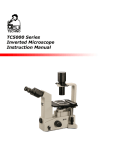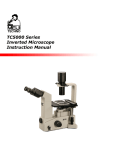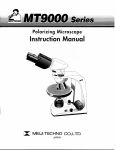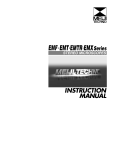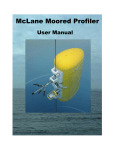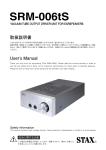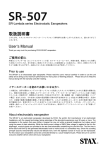Download Meiji Techno FL-PWJ Instruction manual
Transcript
Model FL-PWJ Power Supply Model FL-LHJ Lamphouse Instruction Manual Table of Contents 1.0 Introduction 1.1 Power Supply & Lamphouse Features 1.2 General Safety Guidelines 1.3 Warning/Caution symbols used in this manual 1.4 Intended Product Use Statement 1.5 Product Safety Information 1.6 Warranty Notes 2.0 The Components 2.1 Installation Site 2.2 Unpacking 2.3 Set Up 2.4 Bulb Installation or Replacement, Step-by-Step 2.5 Bulb Alignment for TC Models 2.6 Bulb Alignment for MT Models 3.0 Operation 3.1 UV Light Safety Considerations 4.0 Maintenance and Cleaning 5.0 Troubleshooting 5.1 Fluorescence Lamp does not work 5.2 Replacing the Fluorescence Lamp 6.0 Specifications Model FL-PWJ Power Supply & FL-LHJ Lamphouse 1. Introduction The Meiji Techno FL-PWJ Epi-Fluorescence Illuminator Power Supply is a precision engineered product incorporating efficient, silent-running switchmode power supply technology delivering smooth, regulated current. The FL-PWJ Power Supply is designed only to support 100 watt HBO DC arc lamps. The advanced switchmode design provides constant, low-noise DC power that automatically adjusts for the condition of the DC lamp in circuit. The FL-PWJ Power Supply comes standard with a panel mounted circuit breaker and provides accidental unplug protection to guard against laboratory mishaps. A panel mounted Elapsed Time Panel Meter keeps track of the DC arc lamp hours in use so replacements can be easily accommodated. The reset button on the panel meter resets to “zero” when arc lamps are replaced. This system was designed for easy plug-n-play integration with 100 watt HBO illumination commonly used in fluorescence microscopy work with no additional adjustments necessary for the lifespan of the arc lamp. The FL-PWJ Power Supply can be used with the TC Series Inverted EpiFluorescence Microscope and comes standard on the MT6000 Series EpiFluorescence Upright Biological Models. 1.1 Power Supply & Lamphouse Features • • • • • • • • • • • • Integrated Focusing Collector Lens in Lamphouse Integrated Concave Mirror optimizes DC Arc Components Solid State Switchmode Type Power Supply Supports 100watt HBO Mercury DC arc lamps Warm up time: ~ 2 minutes Elapsed Time Meter Power Supply & Lamphouse are Convection Cooled ( no fan noise ) Resetable Front Panel Breaker Accidental Unplug Protection on Output CE Approved, UL pending 1 year Conditional Warranty Country of Origin: Japan 1.2 General Safety Guidelines This manual contains important safety instructions and information concerning the installation, operation and maintenance of the FL-PWJ Power Supply. This manual should be read carefully before any attempt is made to operate this equipment. To ensure safe operation the user must read and adhere to all of the directions put forth in this manual. Meiji Techno products are designed for safe operation under normal operating conditions. The instrument and accessories described in this manual have been built and tested according to industry safety standards for electronic laboratory instruments. Incorrect usage or non-conformance to operating instructions can cause personal injury or damage to equipment or property. Keep this manual near your instrument for easy reference. 1.3 Warning/Caution Symbols Used in this Manual You must be aware of all safety issues when you install and operate this microscope system. Several warning and caution symbols are listed below. These symbols are used throughout this instruction manual. For your safety, be sure to follow all instructions associated with the symbols listed below. Disregarding instructions marked with this symbol may lead to serious bodily injury or possibly death. Operational warning; failure to operate equipment properly may result in damage or injury. Possible electrical shock hazard exists Disregarding instructions marked with this symbol may lead to serious injury or property damage. Caution for heat or hot surfaces. Risk of burns or serious injury! This symbol designates technical note or product tip. 1.4 Intended Product Use Product Disclaimer: This product is designed and intended for use only as a biological microscope illumination system. Modifying this product in any way for use in any situation other than the original and intended product design will automatically void the warranty. In no event shall Meiji Techno be liable to any person for any incidental, indirect or consequential damages, arising out of or in connection with the use or performance of a modified or altered product. 1.5 Product Safety Information This product is not intended to be used in the immediate vicinity of water or a water outlet or placed in any location where water may penetrate the instrument. Water penetration may result in electrical shock or death. Choose only a suitable environment for your microscope. Do not subject the product to extreme temperature fluctuations. Extreme temperature changes may lead to condensation within the unit which may result in damage to components. Disassembly of the product may result in electrical shock, injury or death, equipment damage, loss of warranty coverage or may create other potential hazardous consequences. Always turn off the power switch and disconnect the cord from the power supply when replacing fuses, connecting or disconnecting wiring, doing general maintenance or replacing the DC arc lamp. DO NOT OPERATE UNLESS THE UNIT IS PROPERLY GROUNDED! Use only the specified power cord in a well grounded socket. Do not use in an ungrounded power receptacle or in cases where there is a break in the ground conductor or damage to the electrical wiring. Only fuses of the specified type and rating are to be used as replacements. Switch off the power and disconnect the power cord before replacing fuses. Use of a non-compliant fuse may result in electrical shock or severe damage your equipment. The lamp and lamp house become extremely hot during and after operation. Do not place any highly flammable or volatile material close to the lamp-house during or after operation. Do not touch the lamp house or attempt to replace the bulb for at least 30 minutes after the unit has been turned off or injury may result. Do not obstruct the air vents on the lamp-house or power supply. The lamp housing and power supply should must be located at least 10 cm (4 inches) away from the nearest wall or any combustible objects. Modifying the product in any way or unauthorized attempts to disassemble or use the instrument for applications other then its intended design will automatically void the warranty. 1.6 Warranty Notes Meiji Techno warrants this product against defects in material and/or workmanship for one year from the date of the original purchase to the original purchaser. Meiji Techno will repair or replace, at its option, any product which under normal conditions of use and service proves to be defective in material or workmanship. No charge will be made for labor or materials with respect to defects covered by this warranty, provided all repair work is done by Meiji Techno. This warranty does not cover expenses incurred in the removal or reinstallation of any instrument or instruments, whether or not proven defective. Replacement or repairs furnished under this warranty are subject to the same terms and conditions of the original warranty. This warranty supersedes any other warranty and is subject to the following terms and conditions: WARRANTY Warranty of Meiji Techno products extends to the original purchaser of the product and is not transferable. WARRANTY DURATION Meiji Techno warrants this product against defects in material and/or workmanship for the life of the product from the date of original purchase to the original purchaser. The electrical warranty is limited to one year. OWNER’S REGISTRATION CARD Return of the owner’s registration card by the original purchaser within ten (10) days after the original purchase is a condition precedent to coverage under this warranty. Meiji Techno will at its option accept written proof of purchase from the original owner in lieu of a product registration card. EXCLUSIONS AND LIMITATIONS Specifically excluded from this warranty are failures caused by abuse, neglect, misuse, improper operation, normal wear, accident, improper maintenance or modifications of ANY type. This warranty does not cover repair or replacement where normal use has exhausted the life of a part, product or instrument. All mechanical devices need periodic parts replacement and service to perform well. Service life of a product is dependent upon the care it receives and the conditions under which it has to operate. In no event shall Meiji Techno be liable for incidental or consequential damages. SERVICE To obtain service under this warranty, please contact Meiji Techno directly and ask for the Product Service Department. State the nature of the problem, model and serial number of the product, date of purchase and location and name of the distributor the instrument was purchased from. After verification of warranty registration, Meiji Techno will issue a return authorization number. Customer may then return the product postage prepaid and insured to the authorized repair facility. In most instances, requests for warranty service will be performed in a prompt and routine manner and merchandise will be returned in a reasonable period of time. In some cases, requests for warranty service are received which are not justified. In these cases, Meiji Techno will provide an explanation for nonwarranty action. WARRANTY TERMS The terms of this warranty may not be varied by any person, whether or not purporting to represent or act on behalf of Meiji Techno. This warranty is provided is in lieu of any and all other warranties, expressed or implied, whether for merchantability or fitness for a particular purpose or otherwise. Liability for consequential damages under any, and all warranties are excluded to the extent exclusions are permitted by law. This warranty gives you specific legal rights and you may also have other rights which vary from state to state. This warranty sets forth the customer’s exclusive remedy, with respect to defective products. This limited warranty shall become null and void in the event of a violation of the provisions of this limited warranty. 2.0 The Components The image below designates the main components of the FL-PWJ Power Supply. 1. 2. 3. 4. Power Switch Run Indicator Lamp Panel Mounted Elapsed Time Meter Reset Button The image above indicates the main components of the back panel. 5. Output Port (The Lamphouse harness plugs into this connector.) 6. IEC Standard inlet connector for standard IEC powercord sets. 7. DC Arc Lamp Access Panel Screws (2) 8. X-Y adjustment for integrated concave mirror 9. Concave Mirror Position Set Screw 10. Concave Mirror Adjustment Knob 11. X Position Knob for DC Arc Lamp Adjustment 12. Y Position Knob for DC Arc Lamp Adjustment 13. Dovetail Fitting 14. Collector Lens Focus Adjustment Knob 2.1 Installation Site The system should be operated in a room with as little dust as practically possible. Keep the power supply and lamphouse away from solvents, chemical fumes and excessive humidity. Also try to avoid big swings in ambient temperature, direct sunlight and excessive vibration. The power supply needs adequate room around the housing to receive airflow. The power supply should have at least 10cm space away from the nearest wall or obstruction. Operating Ambient Conditions Temperature: 0 - 40°C (32 – 96.8°F) Relative Humidity: 20 – 80% up to 30°C (No dew condensation allowed) 2.2 Unpacking Please check your packing slip to insure that all materials are present. Keep a copy for your records so that you have the proper information when ordering more equipment, ordering replacement parts or accessories or when calling for technical support. Please make sure that no small pieces or parts are left in the packing material. Keep the packing materials in a safe place for the purpose of storage and transporting the microscope and its accessories. Avoid touching the surface of optical components such as lenses, filters and glass surfaces. Even very small traces of perspiration or finger oils can corrode the surfaces of optics in a short period of time. 2.3 Set Up • • • • As a first step, remove all components from the shipping container and remove the packing materials. Save the container and packing in a dry location. Remove the access plate on the lamp house by unscrewing the two knobs counter-clockwise until they stop and gently removing the access plate. If the DC Arc lamp is not installed, proceed to install the DC arc lamp in the correct orientation shown below being careful not to touch the glass portion of the DC Arc Lamp: Once the connections are made snugly, re-install the lamp house cover plate and tighten the two access plate screws making sure the captive hardware did engage and that the access plate is tight and flat to the housing. • • Mount the lamp house onto the microscope. The three screws that engage the dovetail fitting should be equally tight, the lamp house should be mounted perpendicular and the lamp house should not be able to turn in its mount when tightened properly. Connect the cable assembly from the lamp house to the power supply being mindful of the position and polarity of the connector. Match the pins from the cable to the panel connector. When properly aligned, the cable connector twists and engages the panel connector and screws all-the-way inwards. The power supply is ready to be plugged into the wall using a standard localized cordset. The mains power cord should only be plugged into a known grounded outlet. Contact your facilities technician if you are unsure of your mains outlet status. A simple outlet tester can be used to verify correct outlet polarity and the presence of a grounded circuit. If no other accessories are going to be installed, the power supply is now ready for use. 2.4 Bulb Installation It is critical to properly install the bulb in the socket. Reversed polarity can dramatically shorten the life expectancy of the particular bulb to as little as one or two minutes followed by a very loud explosion. The writing on the base of the bulb goes down on Mercury lamps. When installing the bulb, the fat positive (+) end of the bulb goes into the clamp and is tightened with the allen wrench. Take steps to insure that the glass part of the bulb is not touched as oils from fingers will degrade the glass and cause pre-mature failure. If you have any difficulty inserting a new lamp into the socket, it may be possible that the stamping (lettering) on the bulb could be too raised. To insure a good contact, the bulb must fit down completely into the socket. A small file can be used to file down the letter stamping on the lamp. Notice the larger lamp mount with the 2 set screws. This is the side that will accept the larger (+) end of either the 100-watt Mercury lamps: Ushio # (-) Connection Cathode (HBO) USH-102DH 7.5 mm Ø (+) Connection Anode 9 mm Ø Step by Step Instructions 1. Set the lamp house panel down on a work surface such that the lamp mount faces you. 2. Plug the gold pin of the trigger lead into high voltage receptacle, if not already installed. 3. Slide desired lamp into the lamp holder. 4. Slide the bulb clamp onto the negative (-) end of the lamp. 5. Hold the bulb clamp and trigger lead. Using the supplied allen wrench, tighten the clamping screws snugly and evenly. Be careful not to place ANY stress on the lamp. 6. Tighten two set screws on (+) side of lamp. 7. Pick up side panel with mounted lamp. Note markings on side panel. Rotate panel until appropriate end has the text and indexer aligned correctly. 8. Insert panel in lamp house opening. Rotate and tighten the two black knobs clockwise to lock the door. 9. Plug the socket into the power supply and plug the power supply into the outlet. 10. Ignite lamp by turning on the power supply and adjust lamp house controls to get proper arc alignment within the field of view. Refer to the microscope instructions for more information regarding arc alignment. Once alignment has been set, it will not need any further adjustment until a new bulb is installed. If you have any problems with this procedure, please contact your microscope sales person. PROPER SAFETY GOGGLES AND PROTECTION ARE NECCESARY WHEN OPERATING EQUIPMENT THAT HAS ULTRA-VIOLET LIGHT CONTENT. 11. A new bulb should ALWAYS be run for two hours initially to stabilize the arc of the lamp. 2.5 Bulb Alignment – TC Models After the bulb has burned in, the system is ready for arc lamp alignment. There are many methods to accomplish arc lamp alignment if one were to go look on the internet. The following is only one of many methods. 1) If the arc lamp is not already burning, turn on the power supply and let the arc lamp “settle” for at least 5 minutes. 2) On the stage of the TC, place a piece of plastic on the stage that fluoresces with any of the filter sets installed as shown below. One may have to find the appropriate color of plastic that fluoresces with the filter sets you have or buy a set of fluorescing slides from Chroma Technology Inc or similar. 3) Open the filter slider on the illuminator so that the light travels through the system. Engage the field iris diaphragm all the way open. Engage the fluorescence filter slider to a position where the plastic specimen fluoresces. If the FOV is too bright to look at, use a different specimen that is less affected, what is important is the specimen is consistent or even across the FOV. 4) While looking into the eyetubes, reach to the centering controls on the lamphouse and adjust both the X and the Y controls to achieve the brightest spot in the center of the FOV or field of view. 5) While still looking into the eyetubes, turn the knob on the lamphouse which controls the focus of the collector lens assembly. Notice when you turn the knob, that the light spreads outward and inward. Leave the knob in a position in which the light is as even as can be made at this point. 6) While looking into the eyetubes, reach to the centering controls on the integrated concave mirror. On a TC system, one may need an assistant as it is hard to reach the mirror controls and still be able to see the FOV effectively. Adjust the concave mirror controls in such a way as to reflect the arc back into itself further homogenizing the light in the FOV. 7) Check the effect achieved when the collector lens focus knob is adjusted and continue to make minor adjustments to the arc position and the mirror position until the light is as even and centered in the FOV as possible. 8) Remove the plastic slide and place a known good biological fluorescence sample on the stage and again check the effect achieved when the collector lens knob is adjusted and continue to make minor adjustments to the arc position and the mirror position until the FOV displays an even an image as possible. 9) If a shadow is seen the FOV, you do not have the field iris centered AND the field iris not open all-the-way. 2.6 Bulb Alignment – MT Models After the bulb has burned in, the system is ready for arc lamp alignment. There are many methods to accomplish arc lamp alignment if one were to go look on the internet. The following is only one of many methods. 1) If the arc lamp is not already burning, turn on the power supply and let the arc lamp “settle” for at least 5 minutes. 2) On the stage of the MT, place a piece of plastic on the stage that fluoresces with any of the filter sets installed as shown below. One may have to find the appropriate color of plastic that fluoresces with the filter sets you have or buy a set of fluorescing slides from Chroma Technology Inc or similar. 3) Open the filter slider on the illuminator so that the light travels through the system. Engage the field iris diaphragm all the way open. Engage the fluorescence filter selector wheel into a position where the plastic specimen fluoresces. If the FOV is too bright to look at, use a different specimen that is less affected, what is important is that the specimen is consistent or even across the FOV. 4) While looking into the eyetubes, reach to the centering controls on the lamphouse and adjust both the X and the Y controls to achieve the brightest spot in the center of the FOV or field of view. 5) While still looking into the eyetubes, turn the knob on the lamphouse which controls the focus of the collector lens assembly. Notice when you turn the knob, that the light spreads outward and inward. Leave the knob in a position in which the light is as even across the FOV as can be made at this point. 6) While continuing to look into the eyetubes, reach to the centering controls on the integrated concave mirror. Adjust the concave mirror controls in such a way as to reflect the arc back into itself further homogenizing the light in the FOV. 7) Check the effect achieved when the collector lens focus knob is adjusted and continue to make minor adjustments to the arc position and the mirror position until the light is as even in the FOV as possible. 8) Remove the plastic slide and place a known good biological fluorescence sample on the stage and again check the effect achieved when the collector lens knob is adjusted and continue to make minor adjustments to the arc position and the mirror position until the FOV displays an even an image as possible. 9) If a shadow is seen the FOV, you do not have the field iris centered AND the field iris not open all-the-way. 3.0 Operation Once the microscope has been setup in its working location with all of the components correctly installed, it is ready for use. Do not install any bulb in your instrument other than the ones designated by Meiji Techno. For the Epi-Fluorescence Lamphouse, the following part number is the ONLY recommended replacement bulb: BA005 Replacement Mercury Lamp HBO 100W/2 Always disconnect the power cord from the back of the power supply when not being used, when cleaning your instrument or when making any repairs. Avoid Dismantling Never attempt to dismantle the power supply. This will void your warranty and could possibly lead to the product no longer performing accurately. 3.1 UV Light Safety Considerations Mercury arc lamps have intense UV light content in their output. The U.S. National Institute for Occupational Safety and Health (NIOSH) recommends that exposure to UV energy be controlled and limited as much as practically possible. Exposure to UV radiation even for very brief periods of time can be hazardous. The potential damage depends on exposure time, the type of UV light and individuals with sensitivity to UV. UV light causes sunburn. Long term exposure can result in loss of skin elasticity initially and carcinoma eventually. Absorption of UV light by the eyes will cause inflammation of the cornea called photo keratisis. Continued exposure can lead to the formation of cataracts on the eye lens. Therefore, the following safety considerations should be taken very seriously: • • • • • • Limit access to areas where UV light is present. Post warning signs in the area where the equipment is installed. Always wear protective eyewear and gloves. Be sure your arms and neck are covered. Never directly look at the light source. Close off the light source with the filter slider when not being used. 4.0 Maintenance and Cleaning • Disconnect the power cord on your equipment prior to performing cleaning, maintenance or repair. • Keep electrical components away from moisture or humidity. • In warm humid climates, take special care to prevent your equipment from exposure to fungal growth. Dust Protection Be sure to use the supplied dust cover with your microscope after each work session. Cleaning Dust and fibers can cause “background fluorescence” during fluorescence microscopy so keeping your microscope clean can help the overall quality of your work. Cleaning of Painted Surfaces Use a soft brush or lint-free cotton cloth to removed dust and loose particles. Tough dirt can be removed with some water and a mild detergent. NEVER USE ACETONE OR OTHER HARSH CHEMICALS. Painted or plastic surfaces should not be tarnished or etched with cleaning agents that are too powerful. To clean painted surfaces, use a moistened lint-free cotton cloth with mild soapy water. 5.0 Troubleshooting Meiji Techno products are manufactured in Japan under ISO9000 manufacturing standards. However, if you ever have any difficulty with any Meiji product, feel free to contact us at: Meiji Techno America 3010 Olcott St Santa Clara, CA 95054 800.832.0060 408.970.4799 FAX [email protected] http://www.meijitechno.com Our technical staff is trained to assist you on mechanical or electrical issues you may have. Problems in regard to specimens, fluorochrome fluorescence, specimen preparation, specimen staining, etc. are beyond the scope of this manual. 5.1 Fluorescence Lamp does not work LAMPHOUSE MAY BE HOT TO THE TOUCH. Do not touch the glass envelope of the lamp at any time. Keep the protective sleeve or bag of the lamp during installation and remove it right after installation. • • • Make sure that all cable connections between the lamp house, power unit and mains are all properly established. Check if the lamp house power unit main fuse is intact. Check the logged hours of the lamp for an excess of 200 hours. 5.2 Replacing the Fluorescence Lamp Refer to the companion manual of the Nobska Lamphouse for more on troubleshooting and replacement of the 100W Mercury Lamp. Replacing the mercury HBO lamp within the Nobska housing is not very complex but there is a followed procedure that will make the process easier and less dangerous. If the glass envelope of the mercury bulb happens to break open, you and the immediate environment could be exposed to mercury which is a known biohazard. Please refer to sections 2.4 through 2.6 for information and instructions for replacing, adjusting and burning in your new mercury lamp. 6.0 Specifications Input 90 – 132 VAC 50-60Hz Output Output Stability (Ripple) 20VDC @ 5A < 2.5% P-P Starting Voltage Peak Operating Temperature 2.3KV DC 0 – 40 degrees C Operating Humidity Storage Temperature 20% - 85% RH -20 – 70 degrees C Storage Humidity Supplied Accessories 10% - 90% RH Localized Powercord set, Manual Meiji Techno Co. Ltd. MEIJI TECHNO AMERICA 3010 Olcott St Santa Clara, CA 95054 Toll free: Phone: Fax: Email: Web: (800) 832-0060 (408) 970-4799 (408) 970-5054 [email protected] http://www.meijitechno.com MEIJI TECHNO CO., LTD. 322-1, Chikumazawa, Miyoshi machi, Iruma-gun Saitama 354-0043, Japan Phone: Fax: E-mail: Web: 049-259-0111 049-259-0113 [email protected] http://www.meijit echno.co.jp MEIJI TECHNO UK, LTD. The Vineyard, Axbridge Somerset, BS26 2AN Phone: Fax: Email: Web: 01934 733655 01934 733660 [email protected] http://www.meijitechno.co.uk


























